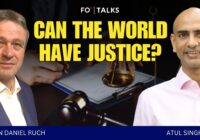The US brand is facing a serious challenge to its seriousness. The Daily Devil’s Dictionary explains.
Former US Ambassador to Bahrain Adam Ereli was interviewed by Yahoo Finance on the question of US sanctions on Iran and the consequences for America’s allies. Unreservedly endorsing President Donald Trump’s initiative, he responded to the team of journalists’ doubts by predicting unmitigated success for the plan, without indicating what he thought success might look like. In so doing, he demonstrated how equivocal the language of diplomacy can be and how cynical its practice has become.
In response to questions about the feasibility of Trump’s bullying Europeans to force them to cooperate, Ereli answered curtly, “You can’t make a threat and not carry it out.” He followed by saying: “I have no reason to doubt the administration’s seriousness in this regard.”
Here is today’s 3D definition:
Seriousness:
The resolute and unwavering intention to aggress or destroy
Contextual note
The idea of “seriousness,” especially in the realm of diplomacy, used to mean something similar to responsible, sensitive to the parameters of a situation and engaged in dialogue. That is clearly not the definition Ereli has in mind here. Since he was a George W. Bush appointee, Ereli’s model of seriousness may be closer to the “resolve” of Bush when his administration made the serious contention that Saddam Hussein was concealing weapons of mass destruction in Iraq. As the world knows, those weapons turned out to be seriously missing. Bush’s seriousness, however, was never in doubt.
Does Ereli really think that all threats must be carried out, especially when they come from a president who spends half his time threatening anyone who even slightly criticizes his policies, including the media who are branded “enemy of the people”? Perhaps he remembers Trump’s threat of “fire and fury” against North Korea and his intention to “totally destroy North Korea.” That certainly sounded serious. Now that Kim Jong-un, expressing his disappointment at the US refusal to loosen sanctions, has indicated he will return to developing his nuclear capacity, does Ereli expect Trump to unleash his fire and fury?
Interviewed in 2014 by the journal Arabian Business, Ereli weighed in on the growing conflict between Saudi Arabia and Qatar. The interviewer asked him about the role of human rights in US diplomacy. His answer reflected both the reigning diplomatic orthodoxy of the Obama years and the brutal realism of what actually drives US diplomacy: “America’s power is a combination of our economic might, our military might and our moral strength. When I say moral strength I mean the ideal of what America represents, that is what I would call our brand. If you are selling a product … if the ideal of the brand suffers, you are not going to be able to sell anything.”
In other words, “moral strength” is, in his eyes, more about strength than morality. The US is a brand to be sold. The “ideal” that Ereli mentions is simply the impression the public takes away, not the substance of the product. What he proposes sounds more like window dressing than moral example.
 Ereli’s theory about the inefficacy of European pushback is interesting, but at the same time profoundly cynical. He claims the Europeans are making promises they don’t intend to keep as a ploy to persuade Iran to respect its commitment to the terms of the Joint Comprehensive Plan of Action (JPCOA). Some will call it American optimism, others a variation of John Bolton style hubris. It is based on the belief that nations will cave to American strength, which no longer masquerades as Ereli’s “moral strength.” “It’s all a bunch of talk” is how he summed up the Europeans’ adoption of a moral position.
Ereli’s theory about the inefficacy of European pushback is interesting, but at the same time profoundly cynical. He claims the Europeans are making promises they don’t intend to keep as a ploy to persuade Iran to respect its commitment to the terms of the Joint Comprehensive Plan of Action (JPCOA). Some will call it American optimism, others a variation of John Bolton style hubris. It is based on the belief that nations will cave to American strength, which no longer masquerades as Ereli’s “moral strength.” “It’s all a bunch of talk” is how he summed up the Europeans’ adoption of a moral position.
Ereli may be right about the ability of Europeans to resist, but given the serious decline in the moral “brand” of the US in recent years, his previous intuition about the importance of that brand may be the reason why his optimism will not be justified. Further weakening of the brand will lead to other, wider and deeper forms of global resistance.
A first indication of that resistance has already come to the fore from Turkish President Recep Tayyip Erdogan, quoted by The Times of India with this to say about the sanctions: “[T]hey are aimed at upsetting the global balance. They are against international law and diplomacy. We don’t want to live in an imperial world.” This cannot be good for the US brand, which desperately wants to avoid being thought of as an empire even as it increasingly acts like one.
Historical note
Seriousness has come to become synonymous with cynicism as the result of a recent historical trend. Glenn Greenwald traced the recent history of the notion of seriousness back to the Bush years, when “Iraq War opponents were instantly marginalized in establishment discourse and only war advocates were deemed to be Serious.”
All the administrations of both parties before Trump donned a mantle of seriousness, almost like a uniform. They owed their legitimacy to the bureaucratic seriousness of their management of government and the economy. Everything that Trump has now so vehemently discarded. He owes his election to the significant minority of the public who were fed up with the seriousness of the past.
Ereli’s cynicism has redefined the notion of seriousness for the age of Trump, Bolton and Mohammed bin Salman (MBS). It now means having the balls to act on threats and not worrying about the consequences. The problem is that such bold seriousness can backfire, as it appears to have done for MBS, who consistently demonstrated his resolve by jailing dissidents and murdering journalists when required.
As the US begins to digest the results of the midterm elections, the world will begin to see what brand of seriousness will be promoted in the next two years.
*[In the age of Oscar Wilde and Mark Twain, another American wit, the journalist Ambrose Bierce, produced a series of satirical definitions of commonly used terms, throwing light on their hidden meanings in real discourse. Bierce eventually collected and published them as a book, The Devil’s Dictionary, in 1911. We have shamelessly appropriated his title in the interest of continuing his wholesome pedagogical effort to enlighten generations of readers of the news.]
The views expressed in this article are the author’s own and do not necessarily reflect Fair Observer’s editorial policy.
Support Fair Observer
We rely on your support for our independence, diversity and quality.
For more than 10 years, Fair Observer has been free, fair and independent. No billionaire owns us, no advertisers control us. We are a reader-supported nonprofit. Unlike many other publications, we keep our content free for readers regardless of where they live or whether they can afford to pay. We have no paywalls and no ads.
In the post-truth era of fake news, echo chambers and filter bubbles, we publish a plurality of perspectives from around the world. Anyone can publish with us, but everyone goes through a rigorous editorial process. So, you get fact-checked, well-reasoned content instead of noise.
We publish 2,500+ voices from 90+ countries. We also conduct education and training programs
on subjects ranging from digital media and journalism to writing and critical thinking. This
doesn’t come cheap. Servers, editors, trainers and web developers cost
money.
Please consider supporting us on a regular basis as a recurring donor or a
sustaining member.
Will you support FO’s journalism?
We rely on your support for our independence, diversity and quality.






